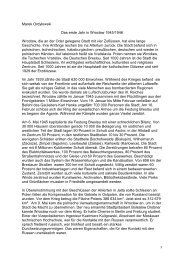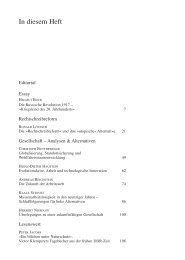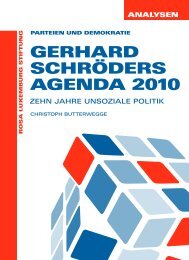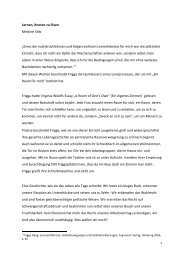Schöne neue Demokratie - Rosa-Luxemburg-Stiftung
Schöne neue Demokratie - Rosa-Luxemburg-Stiftung
Schöne neue Demokratie - Rosa-Luxemburg-Stiftung
Erfolgreiche ePaper selbst erstellen
Machen Sie aus Ihren PDF Publikationen ein blätterbares Flipbook mit unserer einzigartigen Google optimierten e-Paper Software.
»The Death of Conquest« ist ein weiteres Beispiel für eine ablehnende Haltung,<br />
die mit dem Fehlen der Merkmale der klassischen imperialen Ordnung argumentiert:<br />
»But we are clearly not conquerors in the classical imperial sense. We do not<br />
seek permanent physical control. We are neither interested in forcibly subjugating<br />
nor in forcibly absorbing foreign populations. We do not exact tribute. Nor do we<br />
force anyone to labor on our behalf. Perhaps most significant but least appreciated,<br />
we also do not militarily seize or appropriate anything without offering<br />
compensation.« 32 Auch ein hard core neoconservative wie Charles Krauthammer<br />
hat sich gelegentlich von dem Begriff distanziert: »The use of the word ›empire‹<br />
in the American context is ridiculous. It is absurd to apply the word to a people<br />
whose first instinct upon arriving on anyone’s soil is to demand an exit strategy. I<br />
can assure you that when the Romans went into Gaul and the Bristish into India,<br />
they were not looking for exit strategies. They were looking for entry strategies.« 33<br />
Hier wird stattdessen weiterhin den Begriff »Hegemonie« vorgezogen – was wiederum<br />
von anderen Vertretern der neokonservativen Strömung wie Deepak Lal<br />
abgelehnt wird: »the starting point must be to recognize the United States not merely<br />
as the world’s hegemon, but as an empire.« 34<br />
Im Wesentlichen ist eine mehr oder weniger explizite Referenz auf den Begriff<br />
Empire im Diskursraum des Neokonservatismus mittlerweile problemlos. Die Rede<br />
vom »American Empire« wird als politisch-rechtliche Konsequenz einer <strong>neue</strong>n<br />
militärisch-politischen Selbststärkung der ökonomisch wie kulturell uneinholbar<br />
dem Rest der Welt davongezogenen USA interpretiert. 35 Die USA befinden sich<br />
definitiv im Aufstieg: »This is the end of the decline« (Michael Novak), die declinists<br />
haben theoretisch wie praktisch verloren. Und die Rede vom American Empire<br />
ist selbst nur ein Element des konsequenten Verzichts auf die alte Rhetorik<br />
32 Anna Simons: The Death of Conquest. In: The National Interest 71 (2003), S.42.<br />
33 Charles Krauthammer: Democratic Realism: an American Foreign Policy for a Unipolar World, Washington<br />
2004, S. 2. Ähnlich auch Dan Morgan: A Debate Over US »Empire« Builds in Unexpected Circles. In: Washington<br />
Post v. 10. 8. 2003. Für Glazer ist daegegen die »junge« Generation der Neokonservativen von der triumphalistischen<br />
Hauptidee des »Empire« okkupiert, siehe Liel Leibovitz: Tales of the Neocons. In: The Jerusalem Report<br />
v. 28. 6. 2004.<br />
34 Deepak Lal: An Imperial Denial. In: Yale Global v. 6. 1. 2005.<br />
35 In der theoretischen Debatte des Neokonservatismus stehen für die Entwicklung dieser Position und ihrer Kritik<br />
seit Anfang der 90er Jahre etwa Texte von Charles Krauthammer: The Unipolar Moment. In: Foreign Affairs<br />
Nr. 70 (1990-91); Michael Mastanduno: Preserving the Unipolar Moment: Realist Theories and U.S. Grand Strategy.<br />
In: International Security 4/1997, S. 49-88; Barry R. Posen; Andrew L. Ross: Competing Visions of U.S.<br />
Grand Strategy. In: International Security 3/1996-7, S. 5-53; William C. Wohlforth: The Stability of a Unipolar<br />
World. In: International Security 1/1999, S. 4-41; Robert Kagan; William Kristol: The Present Danger. In: The<br />
National Interest 59 (2000), S. 57-69; Zalmay Khalilzad: Losing the Moment? The United States and the World<br />
After the Cold War. In: Washington Qarterly 2/1995. S. a. John G. Ikenberry: After September 11: America’s<br />
Grand Strategy and International Ordner in the Age of Terror. In: Survival 4/2001-02, S. 19-34; Steve E. Miller:<br />
The End of Unilateralism or Unilateralism Redux? In: The Washington Quarterly, 1/2002, S. 15-29; Joseph S.<br />
Nye: Tests: Between Concert and Unilateralism. In: The National Interest Winter 2001/02, S. 5-13; Robert Jervis:<br />
Doomed to Failure: Grand Strategy in a Weak State, Lecture v. 2. 2. 2000 in Yale. Zuvor bereits sehr einflußreich<br />
Zbigniew Brzezinski: The Grand Chessboard: American Primacy and Its Geostrategic Imperatives.<br />
New York 1997.<br />
152

















